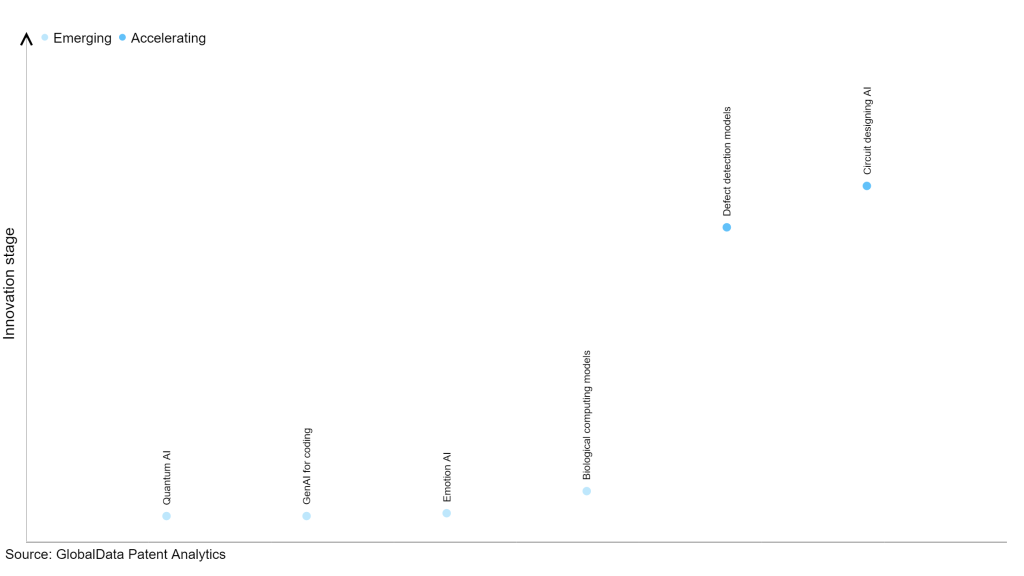The technology industry continues to be a hotbed of patent innovation. Activity is driven by the increasing demand for precision and efficiency in manufacturing, alongside the potential for substantial cost savings and improved product reliability, and growing importance of technologies such as computer vision for accurate visual inspection, machine learning models for pattern recognition, and Internet of Things (IoT) sensors for real-time data collection, collectively driving advancements in quality control AI solutions. In the last three years alone, there have been over 1.5 million patents filed and granted in the technology industry, according to GlobalData’s report on Artificial intelligence in technology: quality control AI. Buy the report here.

Access deeper industry intelligence
Experience unmatched clarity with a single platform that combines unique data, AI, and human expertise.
However, not all innovations are equal and nor do they follow a constant upward trend. Instead, their evolution takes the form of an S-shaped curve that reflects their typical lifecycle from early emergence to accelerating adoption, before finally stabilizing and reaching maturity.
Identifying where a particular innovation is on this journey, especially those that are in the emerging and accelerating stages, is essential for understanding their current level of adoption and the likely future trajectory and impact they will have.
185+ innovations will shape the technology industry
According to GlobalData’s Technology Foresights, which plots the S-curve for the technology industry using innovation intensity models built on over 1.6 million patents, there are 185+ innovation areas that will shape the future of the industry.
Within the emerging innovation stage, quantum AI, GenAI for coding and emotion AI are disruptive technologies that are in the early stages of application and should be tracked closely. Biological computing models, defect detection models and circuit designing AI are some of the accelerating innovation areas, where adoption has been steadily increasing.
Innovation S-curve for artificial intelligence in the technology industry

Quality control AI is a key innovation area in artificial intelligence
Quality control AI utilizes artificial intelligence technologies to oversee and uphold product and process quality. It encompasses the application of sophisticated algorithms and machine learning methods to scrutinize data, identifying any discrepancies or imperfections that might arise during production or manufacturing. Through the automation of quality control processes, AI contributes to operational efficiency, streamlined workflows, and the enforcement of consistent quality benchmarks.
GlobalData’s analysis also uncovers the companies at the forefront of each innovation area and assesses the potential reach and impact of their patenting activity across different applications and geographies. According to GlobalData, there are 2,070+ companies, spanning technology vendors, established technology companies, and up-and-coming start-ups engaged in the development and application of quality control AI.
Key players in quality control AI – a disruptive innovation in the technology industry
‘Application diversity’ measures the number of applications identified for each patent. It broadly splits companies into either ‘niche’ or ‘diversified’ innovators.
‘Geographic reach’ refers to the number of countries each patent is registered in. It reflects the breadth of geographic application intended, ranging from ‘global’ to ‘local’.
Among the companies innovating in quality control AI, State Grid Corporation of China is one of the leading patent filers. The company's patent is aimed at a method and device for processing power data. It involves creating an evaluation formula for power demand response by considering factors such as load distance, amplification index, and weight coefficient. The invention addresses issues in prior methods, offering a more stable and universally applicable evaluation approach for power demand response systems. Other prominent patent filers in the space include Hitachi and Siemens.
In terms of application diversity, State Grid Corporation of China leads the pack, while Siemens and Intel stood in the second and third positions, respectively. By means of geographical reach, Causam Energy held the top position, followed by Intel and Emerson Electric.
Quality control AI is of paramount importance as it revolutionizes the manufacturing process by automating the detection of defects and anomalies, ensuring higher product quality and consistency. The technology not only improves operational efficiency but also reduces costs associated with manual inspection, ultimately enhancing overall customer satisfaction and brand reputation.
To further understand the key themes and technologies disrupting the technology industry, access GlobalData’s latest thematic research report on Artificial Intelligence (AI).
Data Insights
From

The gold standard of business intelligence.
Blending expert knowledge with cutting-edge technology, GlobalData’s unrivalled proprietary data will enable you to decode what’s happening in your market. You can make better informed decisions and gain a future-proof advantage over your competitors.







